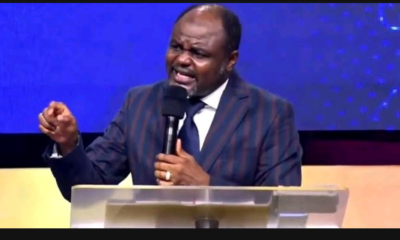Economy
₦70,000 Minimum wage dispute sparks tension among Federal workers
The Federal Government’s selective implementation of the new ₦70,000 minimum wage has sparked fresh unrest among federal public workers, many of whom have yet to see any salary increase.

Employees across various Ministries, Departments, and Agencies (MDAs), including federal universities, have strongly criticized the situation, calling it a clear sign of government insensitivity amid widespread hardship and hunger.
Many workers are frustrated that they have not received the new minimum wage, which was signed into law by President Bola Tinubu on July 18, 2024, after negotiations between the government, the Organised Private Sector (OPS), and labour unions like the Nigeria Labour Congress (NLC) and the Trade Union Congress (TUC).
Conflicting reports from sources within the Accountant-General’s Office and the Budget Office have further complicated the issue.
The Accountant-General’s office contended that the new minimum wage was implemented alongside the September salary payments.
In contrast, the Budget Office claimed that a flat amount of ₦40,000 was paid across the board to all federal workers, a statement that has been met with denial by those affected.
One of the staff of an MDA who spoke to Vanguard anonymously said, “We are fed up with the whole system. We do not know what the government wants us to do.
“It is bad enough that the government removed fuel subsidy and inflicted unbearable suffering and hardship, including hunger on workers and other Nigerians across the country, it is even worse than the minimum wage that has been signed into law for months, in fact, since July, has not been implemented.
“We even heard that some few workers in the core civil service have seen some amount added to their salaries. What sort of arrangement is that? What sort of selective payment is that? Are we not in the same country and experiencing the same hardship and hunger?
“It is pure discrimination and salary slavery designed to keep some of us in perpetual bondage. We have been frustrated, denied and even humiliated by the policies of the government. Many of us have resorted to sleeping in offices, while many others who do not want to sleep in offices trek long distances to work.
“To worsen the suffering, many of us now starve or indulge in self-imposed fasts to cope with the situation. We cannot meet responsibilities to our immediate and extended families. Our children have not resumed school as we have no money to pay their fees and other necessities. We do not know why the government has decided to inflict pain and suffering on us.
“Since the new minimum wage was signed into law, the government has also increased the pump price of petrol and electricity tariff, eroding the value of the new minimum wage that has not even been implemented.
“How does the government want us to survive this assault? Prices of essential communities have continued to rise without any palliative from the government. This is wicked and unfair.”
However, a source in the office of the AGF told Vanguard yesterday that the new minimum wage was effected along with the September salary.
But a source in the Office of Budget and National Planning, who pleaded anonymity, said ₦40,000 was paid to all Federal Government staff across the board instead of the minimum wage.
He explained that the idea was for those formerly on N30,000 minimum wage to have their wages moved to ₦70,000 with the additional N40,000.
Some federal workers, who spoke with Vanguard acknowledged receipt of an extra ₦40,000 in their September salary.
However, a Federal Government explanatory note on the ₦40, 000 board payment obtained by Vanguard yesterday, read, “On the ₦40,000 flat rates narrated as ‘minimum wage’ in the September pay slip, it is just a temporary measure to pay something to civil servants before the official template of the minimum wage becomes available.
“As at the time the September salary voucher was prepared, the template for the new minimum wage was yet to be concluded.
“So, it was concluded that a flat rate be paid to all civil servants, irrespective of level, pending when the template will be available.
“That is why ₦40,000 was reflected in the September pay slip as ‘minimum wage’. But in October, the official template that was released yesterday night will come into full effect.
“Note the new minimum wage by law came into effect on July 28. This means that there will be arrears for August only. But the issue is a 40k flat rate has already been included in the September salary.
“So, if arrears were to be paid, there will be a deduction of the ₦40,000 paid to you in August from the normal amount you are to receive as the increasing figure emanating from the new minimum wage template.”
Reacting to the development, the President of the Amalgamated Union of Public Corporation, Civil Service Technical and Recreational Services Employees, AUPCTRE, and Chairman of the National Joint Negotiating Council, NJIC, (on the Labour side), Benjamin Anthony, decried the selective payment of the new minimum wage.
He said, “An insignificant number of workers has received an addition to their monthly pay, but the majority have not received anything. What that means to me is that nobody has been paid the new minimum wage.
“We are in touch with the office of the Head of Service, HoS, and Integrated Payroll and Personnel Information System, IPPIS. They told us they are making efforts to pay. That to us is very bad news.
“It is as if they do not know that there is hunger everywhere and some children have not gone back to school because of lack of money. This is quite sad.”
Speaking to Vanguard on the situation, the President of the National Association of Academic Technologists, NAAT, Ibeji Nwokoma, said the delay has brought untold hardship to his members.
“Government has fallen short of expectations of public servants. Everybody was expecting that by now the new minimum wage would have been implemented to cushion the effect of an increase in the pump price of petrol.
“People are suffering, people are parking their cars and are unable to take their children to school and families can no longer cope with the present circumstances. We only hear that the government will pay today or pay tomorrow, nobody is sure.
“Government can no longer be trusted. The situation reduces productivity among the working class because people can no longer come to work and expect to go back happy. It’s really affecting productivity and confidence in the public service,” he said.
Similarly, the President of the Senior Staff Association of Nigerian Universities, SSANU, Mohammed Ibrahim, said the delay is causing a lot of economic distress for his members.
He said, “University workers are worst hit as some of our members travel to far distances to get to work, which has in turn affected their morale in terms of productivity.
“We are frustrated with the delay and urge the government to commence the payment immediately to cushion the effect of high cost of living. The salaries members collect currently only take care of fuel and payment of transportation to work.”
-

 Crime10 hours ago
Crime10 hours agoMan k!lls his mother and four young sisters in hotel room with the help of his father to ‘save their honour’ (video)
-

 News11 hours ago
News11 hours ago“Adam and Eve ate nothing, were you there?” – Apostle Abel Damina reveals, says smoking and drinking is not a sin (video)
-

 Crime10 hours ago
Crime10 hours agoBello Turji’s gang kidnaps 10 passengers, burns vehicle in Zamfara
-

 Crime11 hours ago
Crime11 hours agoEx-federal controller of works killed by suspected assassins in Ilorin on New Year day


